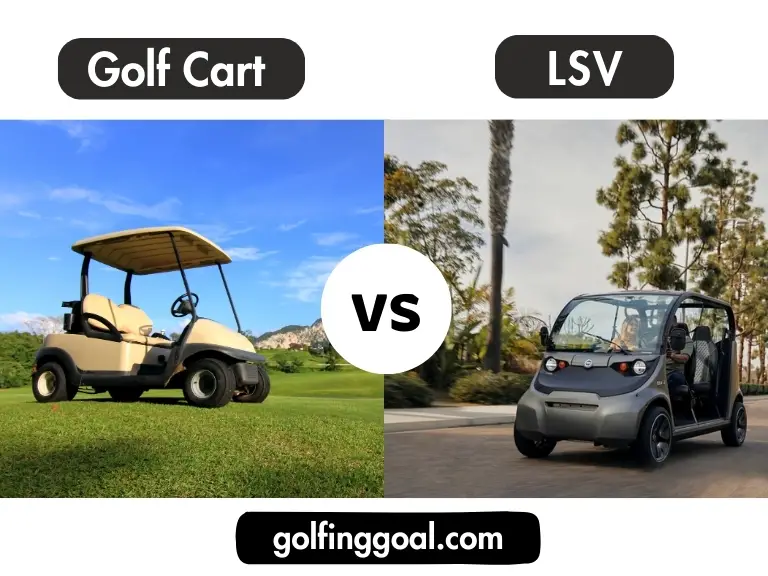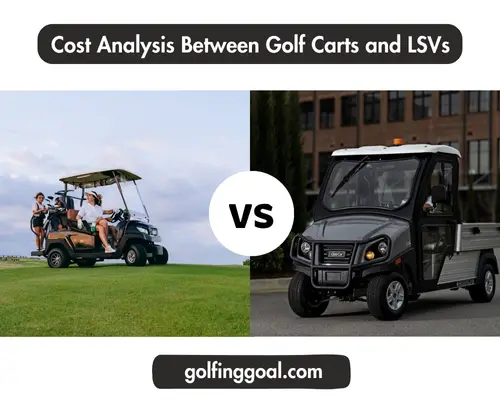
The choice between a Golf Cart and a Low-Speed Vehicle (LSV) often hinges on understanding their distinct features, legalities, and suitability for everyday use.
Golf carts are for leisurely jaunts within gated communities or golf courses, while LSVs offer a street-legal option equipped with necessary safety features for urban roads.
This article aims to provide clear, concise comparisons and practical advice, helping readers make informed decisions based on their specific needs and local regulations.
By highlighting key differences and applications, we guide you toward selecting the right vehicle for your lifestyle.
Key Differences Between Golf Carts & LSVs!
| Feature | Golf Cart | Low-Speed Vehicle (LSV) |
|---|---|---|
| Definition | A small vehicle designed primarily to carry golfers and their equipment around a golf course. | A motor vehicle that is more equipped than a golf cart, designed for low-speed travel on public roads. |
| Speed | Typically limited to about 15-20 mph. | Can go up to 25 mph, as regulated by federal laws. |
| Legal for Street Use | Generally not street-legal; primarily used on golf courses and private paths. | Street-legal on roads with posted speed limits of 35 mph or less in many jurisdictions, following specific regulations. |
| Safety Features | Minimal; may include basic lights and a horn. | Equipped with additional safety features such as seat belts, headlights, turn signals, mirrors, and a VIN. |
| Regulations | No license or registration is required in most cases. | Must be registered and insured. Drivers often need a valid driver’s license. |
| Usage | Mainly for recreational use on golf courses or within closed communities. | Can be used for short commutes, running errands, and transportation within and around gated communities, resorts, and urban areas. |
| Price | Generally less expensive due to simpler construction and lack of advanced safety features. | More expensive than golf carts due to their design for road use, safety features, and regulatory compliance. |
States and Federal Laws for Golf Carts and LSVs
State and federal laws vary for golf carts and LSVs. In the US, over 20 states allow golf carts on specific public roads.
LSVs, recognized by the NHTSA, must have seat belts, mirrors, and headlights. They can travel on roads with speed limits up to 35 mph.
For example, Florida permits both on many streets, following strict safety standards. Federal laws mandate LSVs to meet safety criteria, unlike golf carts.
This distinction helps users decide based on legality and safety.
Cost Analysis Between Golf Carts and LSVs

1. Initial Purchase Price Comparison
Golf carts are usually less expensive. Prices start around $8,000. LSVs, with more features, begin at about $10,000.
2. Maintenance and Operational Costs
Golf carts cost less to maintain. Typically, under $500 annually. LSVs, due to stricter regulations, might need more. Expect up to $700 yearly.
3. Insurance Costs
Insurance for golf carts averages $12 monthly. For LSVs, it’s around $40. LSVs’ street legality increases insurance premiums.
4. Depreciation Rates
Golf carts depreciate about 5-10% per year. LSVs hold value better, with a 4-8% annual rate. The longer lifespan of LSVs contributes to this.
Which Suits You Best? (Golf Cart or LSV)
Factors to Consider Based on Lifestyle, Usage, and Budget
Your lifestyle dictates the choice. Golf carts suit leisurely rounds on the course. LSVs (Low-Speed Vehicles) fit urban commuting. Consider your budget.
Golf carts are generally less expensive upfront but check the long-term costs. Usage is key. Short, safe routes? A golf cart suffices. Daily, road-bound? An LSV may be mandatory.
Pros and Cons Based on User Needs
| Factor | Golf Cart Pros | Golf Cart Cons | LSV Pros | LSV Cons |
|---|---|---|---|---|
| Cost | Less expensive upfront. | Higher long-term costs. | Cost-effective for daily use. | Higher initial price. |
| Use | Ideal for leisure, golf courses. | Not street-legal everywhere. | Road-legal with safety features. | Requires license, and registration. |
| Safety | Simple to operate. | Lacks advanced safety features. | Equipped with seat belts and lights. | More regulations to follow. |
Case Scenarios Where One Might Be Preferred Over the Other
For retirees enjoying golf, a golf cart is perfect. It meets their leisure needs without the hassle of regulations. Urban dwellers favor LSVs for their commute.
With speeds up to 25 mph and street legality, it’s a practical choice. In gated communities, golf carts are often enough. Yet, for outside errands, an LSV is indispensable.
Wrapping Up!
Comparing golf carts and LSVs isn’t as simple as it sounds. It’s about matching your needs with the right vehicle.
No matter if it’s leisurely drives on the golf course or navigating city streets, your decision impacts daily life. Golf carts offer simplicity and ease for specific environments.
LSVs provide broader utility with their street-legal status and enhanced safety features. Consider your lifestyle, the terrain you’ll traverse, and legal requirements. This decision shapes your mobility. Unsure which fits best?

Bob is a golf equipment expert with a wealth of knowledge about the latest and greatest golfing gear. Bob is our Lead Product Reviewer and provides in-depth reviews and recommendations on the best equipment for golfers of all levels. He takes a hands-on approach to testing, using his extensive experience on the course to provide the most accurate and reliable product recommendations. Join Our Team!
